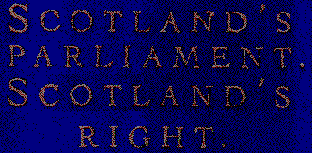


We acknowledge the sovereign right of the Scottish people
to determine the form of Government best suited to their needs.
Twice before, in 1689 and 1842, Scots have acted against misgovernment, when vital questions arose about the constitution and powers of the state, by issuing a Claim of Right. In 1988 this third Claim of Right, formulated by a distinguished Constitutional Steering Committee, headed by Sir Robert Grieve, and sponsored by the Campaign for a Scottish Assembly (as we were then called), was registered on behalf of Scotland.
This led to the establishment of the Scottish Constitutional Convention, and eventually to the Convention's proposals in "Scotland's Parliament. Scotland's Right".
In the modern democratic world the sovereign right of self-determination for nations and peoples is proclaimed in the United Nations Charter and the commonly accepted principle of "rule by consent". Scotland's democratic rights have been eroded since the Treaty of Union with England, and constrained by the application of the English (not Scottish) constitutional principle of the "sovereignty of the Crown in Parliament". This has led to the UK's virtual elected dictatorship, and to violation of the Scottish constitutional principle of the sovereignty of the people.
The Claim starts with a brief historical survey of Scotland's impressive contribution to European history and culture, and the Treaty of Union forced upon the reluctant Scots by the English, with its original safeguards to Scottish institutions, policies and internal autonomy, but with no sanctions to protect them against abuse or dilution.
The terms and the spirit of the Treaty have been repeatedly violated; centralisation to London has been the dominating tendency; administrative devolution to the Scottish Office is no answer, since policy is still determined in London. The Scots are ruled without constitutional safeguards for their consent. The need for an elected Assembly/Parliament is conclusive, but the constitutional and electoral structures of the UK provide no opportunity for the Scottish nation to achieve it within them.
The Steering Committee recommended the establishment of a Constitutional Convention consisting of the elected MPs of all Parties, and Local Councillors, with adjustments in numbers to reflect more fairly he balance of Scottish votes. They also recommended the setting up of a supporting Consultative Body representing substantial national organisations, such as the STUC and the Churches, and including individuals from other organisations and social, cultural, ethnic and economic groupings.
The Committee recommended that the Convention should focus upon drawing up the recommendations for constitutional reform, rather than attempt to be an interim legislative Assembly.
The drafting could draw on previous work done, but
The faults and inadequacies of the English constitution raise the crucial questions of power and consent: the need to make power accountable and to set limits on what can be done without general consent. British government has so decayed that there is little hope of its being reformed within the framework of its traditional procedures. (For attempts to address the problem of reform at UK level see Charter 88 ). Scots can no longer live with such a constitution, and must now show enterprise by starting the reform of their own government.
The route to reform need not lie through the simultaneous re-organisation of the government of all parts of the UK. New anomalies that force people to think are far more likely to be constructive than impossible ambitions to eliminate all anomaly.
The Scottish people can thus claim now their sovereign right to determine the form of government best suited to their needs.
Note: A full printed copy of the Claim of Right for Scotland can be obtained from :
Marion Ralls, Secretary CSP, 22, Royal Circus, Edinburgh EH3 6SS, Scotland. Price £6.00 (include p&p).